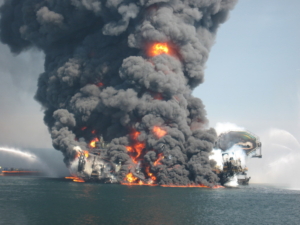A team of geoscientists traveled to the Gulf of Mexico to investigate the site of the Deepwater Horizon oil spill. The team, including Penn State doctoral student in biogeochemistry Uyen Nguyen, wanted to quantify the time that it takes for oil to break down at various depths.
Bacteria and microbes consume oil, but conditions in the deep waters of the Gulf could slow down microbial metabolism. At deep water depths, the water is cold, dark, and under high pressure, slowing down the process of biodegradation.
The team used high-pressure labs at the Hamburg University of Technology in Germany to simulate deep-water conditions, using water and sediment samples from the Gulf. After an 18 day incubation, the team analyzed how bacteria degraded oil compounds like polycyclic aromatic hydrocarbons and n-alkanes. N-alkanes, which are a major compound in oil, took 42 days to completely degrade in sediments deeper than 3280 feet and 19 days at shallow depths. In addition, they found that oil biodegradation rates decreased by 4% for every 328 feet of increased water depth. These results were published in PLOS ONE in July.
The researchers note that understanding the rate of biodegradation is essential for predicting recovery times from spills, especially as deep oil drilling continues in the Gulf of Mexico.

